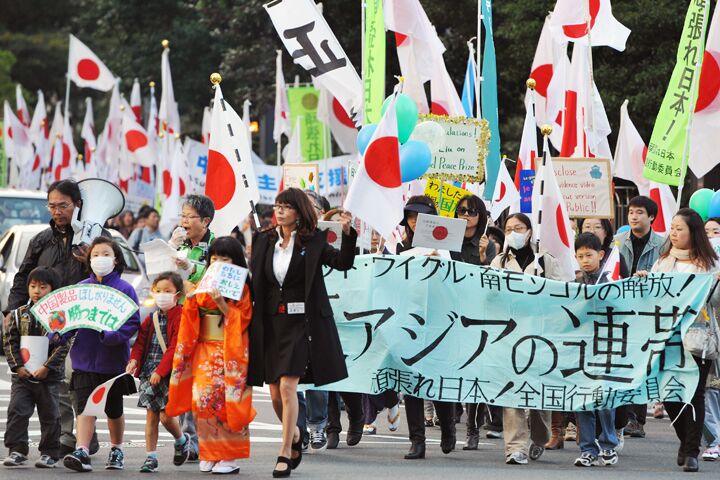
Japan: Nationalism on the Rise
Around 5,000 Japanese nationalists assembled in Tokyo on November 6 to demonstrate against China and to protest Tokyo’s cautious approach to a territorial dispute between China and Japan. The protest is the latest signal that China’s expanding economic clout, growing political assertiveness and increasing military might are injecting a surge of nationalism into Japan’s mainstream.
The protest was the third since early September when a Chinese fishing boat rammed into a Japanese patrol ship near disputed islands in the East China Sea, triggering a high-level tiff in Sino-Japanese relations. After the collision, Tokyo detained the Chinese vessel’s captain, but freed him under pressure from Beijing. Japanese Prime Minister Naoto Kan faced heavy criticism in Japan for his decision to release the captain.
The dispute returned to the headlines after a leaked video showing the collision was posted on YouTube on November 4. The Japanese government had attempted to keep the video from the public eye fearing that the footage, which depicts the ramming as a deliberate act of Chinese aggression, would enrage the Japanese people. In the aftermath of the leak, it is clear that Tokyo’s fears were well-founded.
“It took (a leak of the video) for the Japanese people to learn the truth,” said Toshio Tamogami, leader of Ganbare Nippon, the nationalist group that organized the November 6 protest.
“The government is hiding the truth,” Tamogami said to robust applause from the thousands of protesters in Tokyo’s Hibiya Park.
Japan’s row with China is occurring alongside a separate dispute Tokyo is having with Moscow following a visit by Russian President Dmitry Medvedev to the Southern Kuril Islands, which both Moscow and Tokyo claim. Kan denounced Medvedev’s trip—the first ever by any Russian leader to the islands—as “extremely regrettable,” to which Russian Foreign Minister Sergei Lavrov responded by saying the islands are “Russian land” which the Russian president “can visit whenever he chooses to.”
An opinion survey taken by the Kyodo News Agency on November 7 showed that public support for Kan’s cabinet sharply fell to 32.7 percent this month because of its handling of the conflicts with China and Russia. The figure is down 14.9 percent from the previous poll taken a month earlier.
The provocations are stirring up nationalism and jingoism in Japan partly because it was only two decades ago that Japan was the rising star of Asia. Now it sees that China, drunk on burgeoning power, has taken its place and is throwing its weight around with increasing belligerency. A growing number of Japanese are outraged at the turn of the tables.
The Independent said the news in the summer that China had overtaken Japan as the world’s number-two economy “sparked painful soul-searching” in the nation. That introspection is leading an increasing number of Japanese to desire a stronger Japanese military.
Shintaro Ishihara, governor of Tokyo, said that Japan would be able to confront China’s increasingly thuggish behavior if it had nuclear weapons. Even mainstream Japanese publications such as the Nikkei business daily are playing a part in Japan’s rising anti-Chinese outlook, claiming that the Chinese are purchasing Japanese land to protect China from future food shortages. The Citizens League to Deny Resident Foreigners Special Rights, headed by Makoto Sakurai, has also called for a stronger Japanese military to counter China’s expansion in the region.
Sakurai believes the tides will shift into his nation’s favor. “Japan has been asleep for a long time,” he says. “It’s time we woke up.”
Back in 1971, educator Herbert W. Armstrong predicted that Japan would awake from its postwar slumber, in a return to militarism and nationalism: “Japan today has no military establishment …. But we should not lose sight of the fact that Japan has become so powerful economically that it could build a military force of very great power very rapidly.”
And today, tensions with China and Russia are acting as a prod for Japan to develop its military power. But this does not mean that the current hostilities between these Asian nations are a permanent geopolitical fact. The Chinese dragon seeks to construct an Asian power bloc to replace the U.S. as the region’s dominant power, and Mr. Armstrong believed that for such a bloc to possess strong global influence, it would need to include more than just Russia and China. (To understand this eye-opening Bible prophecy, read Russia and China in Prophecy.)
Despite the current hostility, Japan and China are increasingly dependent on each other economically. China has surpassed the U.S. to become Japan’s most important partner in trade. Last year saw China consume an unprecedented 19 percent of Japan’s total exports, and Japan bought 22 percent of its total imports from China. Twenty years of tension over territory and history have not deterred economic cooperation between China and Japan.
A central facet of Japan’s security is its reliance on the United States, but as U.S. influence in the region fades, Japan will realize it has to reconcile with China by necessity. Japan’s deepening economic intertwinement with China will act as fertile soil in which reconciliation between the two nations can take root. Japan’s economic cooperation with China, alongside the reality of America’s waning influence in the region, will ultimately lead Tokyo and Beijing to the powerful military alliance that Mr. Armstrong predicted all those years ago.
